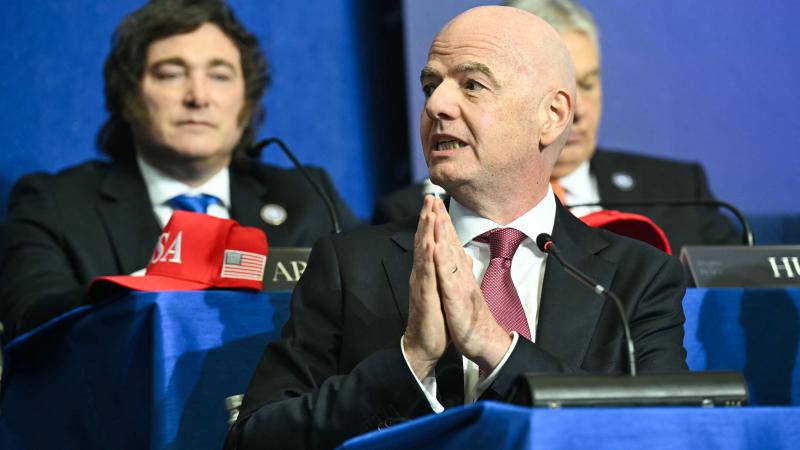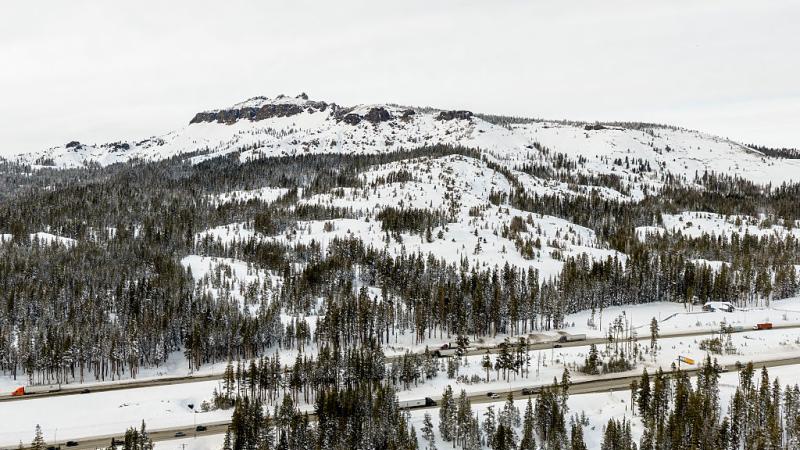South Africa's ties to Hamas, Iran exposed amid financial troubles, genocide case against Israel
South Africa's ties to Hamas, Iran exposed amid financial troubles, genocide case against Israel
With the International Court of Justice having ruled Friday on South Africa's accusations that Israel is committing genocide in Gaza, the case is bringing to light questions regarding Pretoria's relations with Hamas and Iran, as well as the country's serious financial troubles and corruption allegations.
The entire country of South Africa struggles with financial difficulties, with an estimated poverty rate of 62.6% in 2022, according to the World Bank. Additionally, due to a lack of maintenance on coal-fired power plants, residents were left without power for up to 10 hours a day in the first few months of 2023, according to the U.S. State Department. Rolling blackouts decreased to six hours a day by April, per The Associated Press, but some U.S. analysts have predicted that South Africa is still at risk of suffering an energy grid collapse and service failure, including water treatment.
On Friday, the United Nations’ top court decided to allow the genocide case brought by South Africa to proceed against Israel for its military actions in Gaza. The decision in the Hague was made by 17 judges of the International Court of Justice, who also demanded Israel try to contain death and damage in the offensive but did not call for a cease-fire.
South Africa's ruling party, the African National Congress, has been plagued by threats of bankruptcy and allegations of corruption for years. Most recently, the party has turned to crowdfunding in an attempt to stabilize its finances.
Nelson Mandela's ANC is set to face its most competitive election since apartheid ended in 1994. Surveys suggest that the ANC may, for the first time ever, receive less than 50% of the national vote in April's elections, according to the Africa Center for Strategic Studies.
South Africa's constitution prohibits "unrehabilitated insolvents," or people who are bankrupt from running for office, but it is mum on whether a bankrupt party can run candidates. However, that does not appear to be an issue at this time, as the ANC said earlier this month that it was able to stabilize its finances, according to The Sunday Times. It did not give specifics as to how this was accomplished.
The same week that the ANC got its finances in a better state, South Africa brought the genocide case against Israel in the International Court of Justice, according to South Africa's Daily Maverick news outlet.
High-profile South African activists such as former Institute of Race Relations CEO Frans Cronje and Accountability Now Director Paul Hoffman both said earlier this month that reports are emerging that Iran fixed the ANC's finance problem.
"The South African government is the same thing as Hamas. It's an Iranian proxy, and its role in the war is to fight the ideological and ideas war to stigmatize Jews around the world," Cronje during an interview on Chai FM Radio.
Former Trump deputy national security adviser Victoria Coates told the "Just the News, No Noise" TV show this week that "one has to at least wonder" whether Iran is funding the ANC. "This sort of unholy alliance is emerging in a deeply, deeply dangerous way."
Iran's benefits of a close relationship with South Africa include the ability of the African nation to provide Tehran with nuclear support, as the Islamic Republic has been attempting to build a nuclear weapon. Additionally, the Iran-backed Houthis have been attempting to shut down shipping in the Red Sea. The alternative shipping route in the region is South Africa's Cape of Good Hope, so if Iran were to put pressure to shut it down as well, it would be catastrophic for the global economy, Coates also said.
Although South Africa's News24 reported that the Iran funding allegations "don't hold up" because there is "no substantive proof" for it, the outlet is owned by the holding company Naspers Limited, which donated at least 3 million rand, or more than $158,000, to the ANC in 2022 and 2021, according to political finance records.
While ANC spokesperson Mahlengi Bhengu told the Maverick that her party "does declare where its funding is derived" and the idea of receiving funding from Iran is "preposterous," it is impossible to fully refute the allegations without accessing the party's balance sheets, which Just the News has no way of doing.
Regardless, Iran has been bolstering South Africa's economy for years.
Iranian Chamber of Commerce official Mohammadreza Karbasi said in 2019 that Iran's Foreign Direct Investment in South Africa was more than $135 billion in South Africa in 2018. Shortly before Karbasi's announcement, South African Ambassador to Iran Vika Mazwi Khumalo said his nation is ready to exchange tourists with Iran, per the Mehr News Agency, an outlet affiliated with the Iranian government's Islamic Ideology Dissemination Organization.
More recently, Iran and South Africa signed a joint economic cooperation agreement in August, two months before the Oct. 7 attack on Israel, when terrorists, led by the Iran-funded Hamas, killed about 1,200 people in Israel and kidnapped 250 others. The same month as the agreement, Tehran reached a deal with Pretoria to develop five oil refineries in South Africa, according to China state-run outlet Xinhua.
As South Africa cozied up to Iran, whose government for years has sought the destruction of what it has called the "Zionist regime," South Africa's tense relations with Israel dramatically worsened after the Oct. 7 attack.
One day after Oct. 7, South Africa blamed Israel, saying: "The new conflagration has arisen from the continued illegal occupation of Palestine land, continued settlement expansion, desecration of the Al Aqsa mosque and Christian holy sites, and ongoing oppression of the Palestinian people."
Just 10 days after Hamas' brutal Oct. 7, 2023, attack on Israel, South African Foreign Minister Naledi Pandor spoke on the phone with the leader of Hamas, which is a U.S.-designated Foreign Terrorist Organization backed by Iran.
During the Oct. 17 call with Hamas Leader Ismail Haniyeh, Pandor "reiterated South Africa’s solidarity and support for the people of Palestine and expressed sadness and regret for the loss of innocent lives both Palestinians and Israelis" and "discussed how to get the necessary Humanitarian Aid to Gaza and other parts of the Palestinian Territories," according to a summary of the conversation published by the South African government.
The following week, Pandor spent a day in Iran. In Tehran, Pandor met with Iranian President Ayatollah Seyyed Ebrahim Raisi "to convey a message" from South African President Cyril Ramaphosa, according to the South African government. The exact contents of that message were not disclosed.
South Africa cut ties with Israel in November over the war, and earlier this month, it presented its case before the United Nations International Court of Justice, accusing Israel of committing genocide in Gaza.
If Iran did donate money to the ANC, it would not be the first time the party has received contributions from controversial actors.
The ANC received about $1.6 million in monetary and in-kind donations from 2021 through 2022 from a mining company linked to U.S.-sanctioned Russian oligarch Viktor Vekselberg. The money came from United Manganese of Kalahari Ltd, of which Vekselberg owns a significant stake in, per Cyprus business records cited by CNN. Although the U.S. Treasury has sanctioned Vekselberg multiple times, United Manganese has been able to avoid sanctions because he has less than a 50% stake in the company.
One of the other shareholders in United Manganese is Chancellor House, which admitted in 2021 to serving as a funding vehicle for the ANC. The Chancellor House Trust gave more than $1.4 million to the ANC from 2021 through 2023, records show.
Beyond interactions with Iran, the heightened tensions between South Africa and Israel began long before Oct. 7, however.
Israel was one of the earliest countries to criticize South Africa's apartheid system starting in the 1950s. Following the Yom Kippur War, Israel developed what journalist Thomas Friedman called a "realpolitik" attitude towards South Africa in the 1970s, and the two nations deepened ties at a time when most African nations severed relations with Israel over the Organization of Petroleum Exporting Countries' oil embargo. Israel eventually issued sanctions against South Africa in 1987 in response to its apartheid policies.
However, the countries' relationship greatly changed in the post-apartheid era, when Nelson Mandela was elected president under the African National Congress political party.
Mandela had close ties with Palestinian leaders, including Yasser Arafat, who met the South African leader with literal hugs and kisses days after he was released from prison in 1990.
Coates said Mandela "was good friends with Yasser Arafat, and created this kind of affinity with the Palestinians for South Africa."
The Embassy of South Africa in the U.S. did not respond to Just the News' request for comment, nor did the Johannesburg-based think tank the South African Institute of International Affairs or the Carnegie Endowment for International Peace.
















